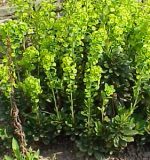
Native to the woodlands of Europe, Turkey and the Caucasus, this bushy evergreen herbaceous perennial is a member of the spurge family, Euphorbaceae, that also includes rubber plant, croton, and caster oil plant. It grows 18-24″ tall and slowly forms rounded mounds up to 18″ across. The leaves are slightly hairy, up to 2 ” long and are alternate on the lower stem but in whorls on the upper stems. They are shiny dark green during the growing season but take on a purplish red color hue when temperatures become cooler in fall. From late spring to early summer large sprays of small chartreuse yellow flowers appear subtended by yellow-green disc-like bracts. The flowers lack petals and sepals but the bracts are showy and last for months. Plants grow well in full sun to part shade and moist to dry soils so are especially valuable as ground cover under trees and in beds, borders and rock gardens. The flowering stems are attractive in flower arrangements. The genus name, Euphorbia, honors Euphorbus, the ancient Greek herbalist and personal physician of Juba II, King of Mauretania, an area in North Africa. The specific epithet, amygdaloides, comes from the Ancient Greek word ἀμυγδάλη (amugdale), meaning almond.
Type: Evergreen herbaceous perennial
Bloom: Yellow-green disc-like bracts subtend small flowers lacking petals and sepals, from late spring to early summer, but persist for many weeks.
Size: 18-24″ H x 12-30″ W
Light: Full sun to part shade
Soil: Average, medium moist to dry, very well-drained
Hardiness: Zones 6-8
Care: Prune lightly immediately after flowering if needed (flowering is on old wood)
Pests and Diseases: None of signficiance
Propagation: Seed (often self-seeds), division in spring
Companion Plants: Golden Japanese forest grass, Italian bugloss, Siberian iris
Outstanding Selections:
subsp. robbiae (broader,darker green leaves than species; more rapid rhizomatous spread than species)
‘Ruby Red’ (ruby red leaves when young)
‘Pupurea’ (burgundy-purple foliage)
Comments: Skin and eye irritant; toxic if ingested
Photo Credit: Kurt Stuber, Wikipedia